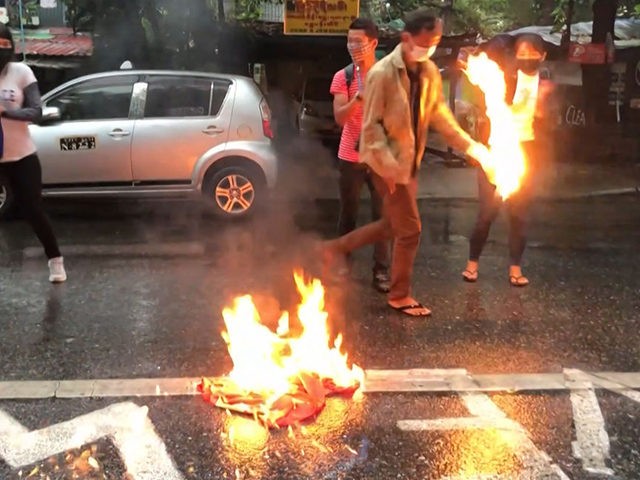Security forces loyal to the Myanmar junta opened fire in several locations Wednesday, killing 13 protesters. The incident resulted in the burning of a Chinese-owned factory in the city of Yangon.
Coup leader Gen. Min Aung Hlaing blamed the protesters for all of the violence and destruction, accusing them of “destroying” the country.
“Although protests are staged in neighboring countries and the international community, they do not destroy businesses. CDM is an activity to destroy the country,” the general said Wednesday, striving to make Myanmar’s pro-democracy activists look more dangerous and illegitimate than comparable movements in other nations.
CDM stands for Civil Disobedience Movement, the blanket term that has become common for the Myanmar protesters, who demand the restoration of civilian rule under the country’s elected leadership.
The civilian government of Aung San Suu Kyi was overthrown on February 1. The junta arrested Suu Kyi and charged her with corruption. Her supporters, and many Burmese legal experts, say the charges against her were fabricated and the military’s actions violate the national constitution.
Many of the protesters believe, with good reason, that China supports the junta and is willing to do business with its leaders, so there have been several attacks on Chinese-owned factories. Another evidently occurred Wednesday at the JOC Garment factory in Yangon, Myanmar’s largest city and commercial hub. No casualties were reported, and there have been no official statements on the extent of the damage.
Witnesses heard a series of seven small explosions in Yangon on Wednesday. The U.S. Embassy heard reports that these were “sound bombs,” essentially fireworks meant to make noise rather than cause significant damage. There were also reports of protesters in Yangon burning Chinese flags.
China’s state-run Global Times declared the JOC Garment factory fire was “likely the work of arson as tools were found on the site” and said Burmese police were reviewing security camera footage to hunt for suspects. The “arson tools” were not described in detail.
The owner of the factory told the Global Times that the fire burned for about an hour on the first floor of the building, destroying “finished and semi-finished products, as well as machines.”
Myanmar’s special envoy to the United Nations, an opponent of the coup known simply as Dr. Sasa, said Wednesday that his country could be heading toward “genocide.” The U.N. envoy to Myanmar, Christine Shraner Burgener, warns that “a bloodbath is imminent” as the protests and junta crackdown threaten to escalate into civil war on “an unprecedented scale.”
The Washington Post agreed Wednesday that civil war is a real possibility, especially as the increasingly frustrated junta has been unable to shut down protests by shutting down the Internet. Not only have the protesters found analog methods of organizing with paper and word of mouth, but they are even developing a “pop-up economy” to work around the junta’s control over the economy.
The Internet shutdown has cost Myanmar a billion dollars so far, and the junta appears much more willing to pay that price than the public. The U.N. warns of growing food insecurity as the prices of food and fuel skyrocket.
As analysts told the Washington Post, the junta is very unlikely to give up power, scale back its repressive tactics, or make any concessions to the protest movement. Demonstrators tired of getting shot in the streets are reportedly arming themselves, forging alliances with ethnic militia groups, and receiving paramilitary training in border camps.
“Increasing levels of violence are hardening opposition and broadening a popular consensus that a return to military rule must be prevented at all costs. The banking system is hardly functioning, transport and logistics are crippled, and ports paralyzed, sending the country spiralling into economic crisis,” warned the International Crisis Group.
Nikkei Asia on Wednesday suggested the junta has underestimated the generational shift in Myanmar, as younger people filling the ranks of the protest movement are more tuned into international news and have studied protests like the ones in Hong Kong.
Some of these younger people have little memory of Myanmar’s decades under military rule, having grown up under the civilian government instituted in 2011, so they were shocked and horrified to see their elected government overthrown by military leaders.
Young residents who spoke to Nikkei Asia said they had given their military considerable benefit of the doubt before the coup, but now they are more willing to believe reports of atrocities such as the ethnic cleansing campaign against the Rohingya Muslims and more inclined to hold top military officers accountable for brutality. As Nikkei Asia pointed out, most young and educated Burmese live in big cities in the geographical center of the country, so until now they have largely taken the army’s word for what happens in the hinterlands and border regions — a trust destroyed by the coup.

COMMENTS
Please let us know if you're having issues with commenting.